10:16
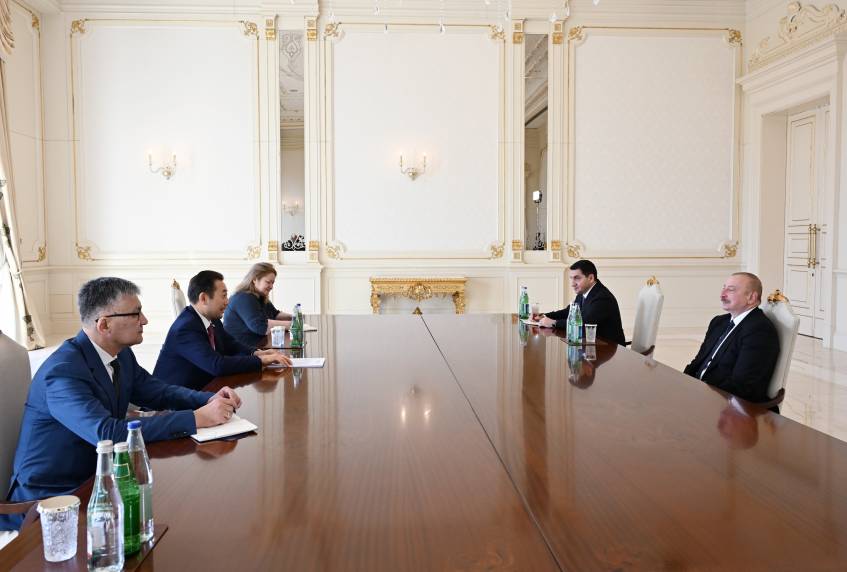
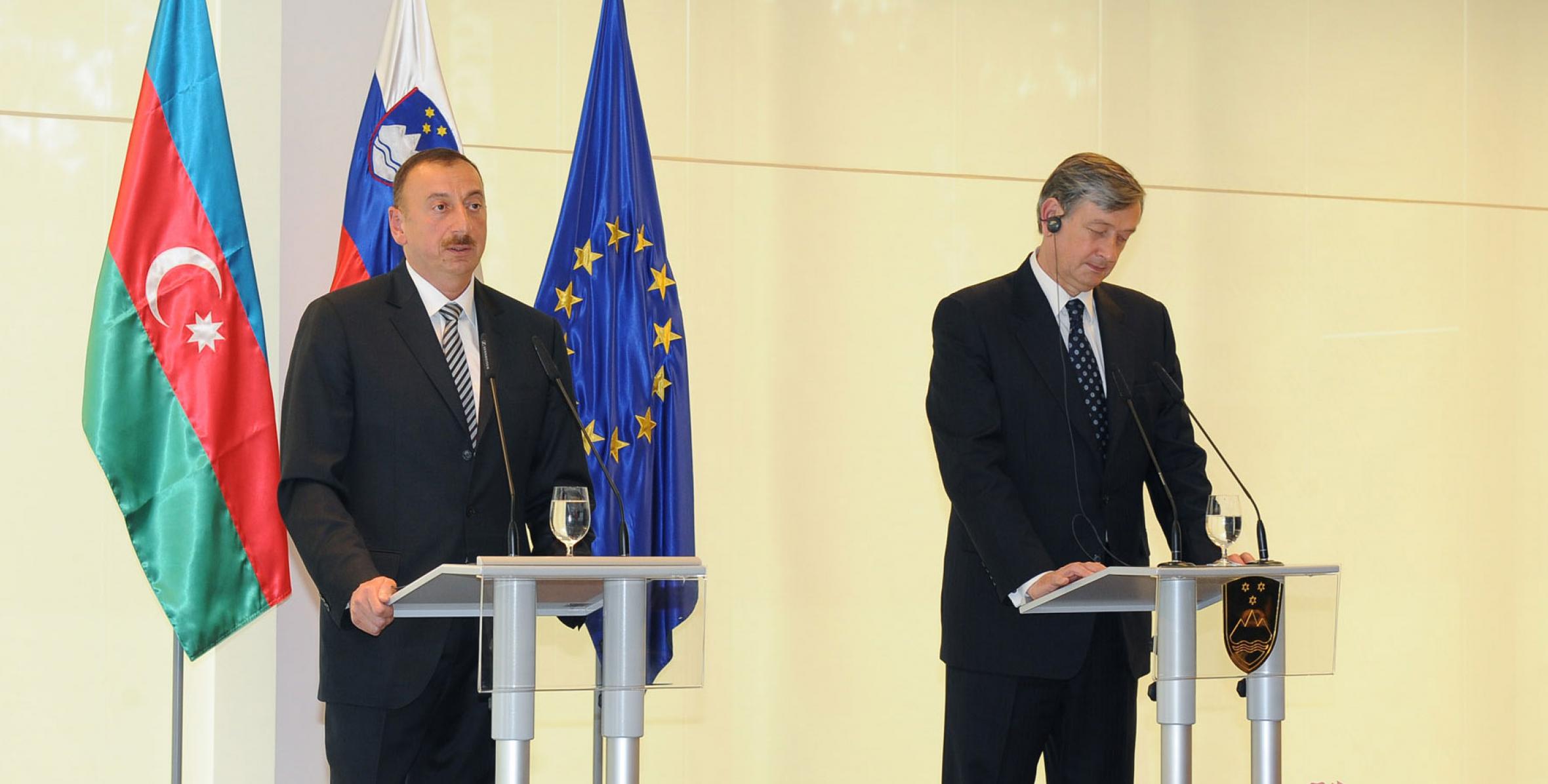
After the documents signing ceremony, Azerbaijani President Ilham Aliyev and Slovenian President Danilo Turk held a joint press conference.
Prior to that, the heads of state made statements.
Statement by Slovenian President Danilo Türk
- The President of the friendly Republic of Azerbaijan, Mr. Ilham Aliyev, who is paying an official visit to our country, is a distinguished guest of the Republic of Slovenia today. In essence, this is a reciprocal visit because in 2009 I paid an official visit to Azerbaijan. And now a reciprocal visit is being paid. This visit is a good opportunity for examining our bilateral relations. We have just signed two documents on cooperation between our countries. We have also reviewed other issues pertaining to Slovenia and Azerbaijan.
I want to note that we have good bilateral relations. Our cooperation is successful, economic relations are also developing. At present, our turnover has increased 10 times. This is already a good result. A number of agreements are due to be signed. We may establish cooperation in the energy sphere, in the construction of power stations, in the area of information technologies, in the insurance sector. We expect Azerbaijani companies to invest in Slovenia. Our cultural cooperation is also expanding. I think there are still many cooperation opportunities ahead of us.
The talks held today have also presented us with the opportunity to review some international issues. Slovenia is paying special attention to the issues of cooperation and security in Europe. We are striving to contribute to this sphere. This issue requires all states to be particularly active, especially if we are talking about armed conflicts.
Of these, we should highlight the Nagorno-Karabakh conflict. This conflict was part of our agenda today. We spoke about it earlier too. We have reviewed my participation, as well as the participation of Armenian President Serzh Sargsyan and Russian President Dmitriy Medvedev in the talks in a trilateral format. The status-quo is not an acceptable option. We must step up our efforts to establish the principles that will lay the groundwork for the peace treaty, the agreement.
As we know, Russian President Dmitriy Medvedev has put forward the initiative of conducting a trilateral meeting in Sochi. Slovenia welcomes other initiatives in this direction too. We have great hopes for the trilateral meeting that is due in Russia at the end of this month. We think that the principles on the basis of which the peace treaty will be reached will be established at this meeting. A solution of this issue should be in line with the Helsinki final act and OSCE resolutions.
We have also reviewed a number of other issues. International energy cooperation has been discussed. This topic is quite interesting for Slovenia. This issue is important for other European countries and the European Union as a whole.
In other words, we want to expand our cooperation with Azerbaijan. Slovenia considers energy security a very important issue. This issue requires an increasingly broader multilateral cooperation. It envisages cooperation both between consumers and suppliers. As you know, as part of our recent talks with the Russian Federation, Slovenia suggested to a number of countries to cooperate more closely with the signatories of the declaration on the southern gas corridor. We have suggested that their involvement should be broader.
I think that this approach in the spirit of multilateral cooperation may lead us to success. There can be no competition here, cooperation is of particular importance.
This is why is I pointed to that in my opening remarks. Of course, we have touched upon other aspects of our relations at the international level. I wouldn’t like to talk for a long time. And now I am pleased to give the floor to you. Please, Mr. President, the floor is yours.
Х Х Х
Statement by Azerbaijani President Ilham Aliyev
- Dear Mr. President!
Dear ladies and gentlemen!
First of all, I want to say that I am very pleased to be in Slovenia again. Thank you for the hospitality our delegation and I have enjoyed.
The relations between our countries are at a very high level. There is a very active political dialogue between us. As Mr. President has said, the President of Slovenia visited Azerbaijan two years ago, and today I am paying a visit to your beautiful country. In the time between the visits, Mr. President and I were in regular touch through telephone. We always meet at international events as soon as there is such opportunity. So the political dialogue between our countries is at a very high level. This, of course, creates a good foundation for the development of our relations and for these relations to cover all other spheres. I am sure that my visit, the documents signed and the decisions to be made at the end of the talks will further strengthen our ties. We are interested in that. Slovenia is one of our very important partners in this region.
We have discussed prospects for economic cooperation today. We have reviewed certain proposals, exchanged views on both mutual investment projects and joint activities of our companies. These issues are likely to be discussed in a broader format during the Slovenian-Azerbaijani business forum due tomorrow. In any case we can say with confidence that both sides have a mutual interest and good opportunities for deepening economic cooperation.
Along with bilateral issues, we have also discussed the relations between the European Union and Azerbaijan. As a member of the European Union, Slovenia is making a significant contribution to the development of relations between the European Union and Azerbaijan. These relations are developing. The visit by European Commission President Mr. Barroso to Azerbaijan early this year, the talks held during the visit, the political decisions and the Declaration are creating good conditions for further cooperation. Our relations with the European Union are at a very high level, and these relations are expanding. We are very positive about the future of our cooperation as well. We think that at present we should discuss specific issues pertaining to the future of our cooperation, clarify and prioritize some matters. We can and must establish a long-term partnership.
Our agenda with the European Union is very broad. Of course, energy security issues are top of the agenda and cooperation in this direction is expanding. Azerbaijan is ready to contribute to European energy security. Our abundant gas resources are already transported to world markets through different routes. Thanks to the establishment of a gas infrastructure, we have diversified our export opportunities. Today we have four pipelines transporting Azerbaijani gas to world markets. These pipelines are in operable condition. Of course, the delivery of our gas resources to world markets via reliable routes requires new contracts. Azerbaijan has confirmed gas reserves of 2.2 trillion cubic meters, which already shows that we are a very important exporter of gas.
Talks on the southern gas corridor are under way. I am sure the negotiations will produce good results. The success of the talks depends on the sincerity of relations and the ties between three parties: producer – Azerbaijan, consumers – the European side, and transit countries. So the interests of all three parties must be secured and every party must contribute to the realization of the project. This cooperation is now emerging. I hope that we can talk about more specific results shortly. But I want to add that this process is very important not only to Azerbaijan but also to Europe. We are interested in expanding our export opportunities and increasing our gas exports to world markets, while consumers are interested in expanding the geography of their gas supplies, and our interests overlap in that.
Also, as Mr. President has said, we have expressed our attitude towards regional security issues. I have informed Mr. President of the latest developments in the settlement of the Armenian-Azerbaijani conflict over Nagorno-Karabakh. Talks are under way, and I hope that they will yield good results. If the issues being discussed today, the fundamental principles, are accepted, a fair solution will become feasible, Azerbaijan’s territorial integrity will be secured, security issues will be resolved and the occupying forces will withdraw from the captured lands.
As you know, Azerbaijan has been a victim of Armenian occupation for many years. Our country’s territorial integrity recognized by the international community has been violated. Twenty per cent of our territory has been captured by Armenian armed forces and Azerbaijanis have been ousted from these lands. So our nation has been subjected to the policy of ethnic cleansing, one million Azerbaijanis have become refugees and IDPs in their native land. The UN Security Council has passed four resolutions which demand an unconditional withdrawal of occupying forces from our lands. OSCE resolutions have a similar meaning. Similar resolutions have also been passed by the European Parliament, the Council of Europe, the Organization of Islamic Conference. Unfortunately, occupying forces have not vacated our lands yet.
Good conditions are now emerging for a fair settlement of the issue. The joint statement made by Minsk Group co-chairmen in late May is already a very serious signal. It says that the current status-quo is unacceptable. We have been saying for many years that the status-quo must be changed and occupying forces must leave the captured territories. Of course, such a clear statement is very inspiring for us as it raises our hopes. Another important aspect is that it refers to the Helsinki final act. The Helsinki final act says there is no contradiction between the principle of territorial integrity and the principle of self-identification of nations. So these two principles must become part of one and the same agreement, and I think that this is also a very positive phenomenon.
At the present stage, the Armenian side should demonstrate a constructive and sincere approach. For many years Armenia was holding talks only for the sake of talks, was imitating them. It is now time to give a concrete answer to the proposals made. And if that doesn’t happen, we think Azerbaijani lands will be liberated from occupiers soon.
We have also exchanged views on regional matters today. There are no disagreements between us. Our approaches are also very similar. I hope that as a result of the discussions that will be continued today and tomorrow we will bring our countries and peoples even closer together. Because we are also bound together through common history.
Mr. President, thank you very much again for the hospitality you have shown us. I want to express satisfaction with my visit to your beautiful country. Thank you.
Х Х Х
Then questions were taken from journalists.
Javid Badalov (AzerTaj): What is your view of the prospects for mutual investments?
President Danilo Turk: First of all, let me say that in general this process commenced during my visit to Baku in 2009. We identified priority spheres, and Slovenia has been trying to work in these spheres in Azerbaijan. Namely, we identified two spheres: information technologies – our company Iskratel is already cooperating with partners in Azerbaijan. We are trying to expand this cooperation further. Another sphere is the renewable and alternative energy. For instance, the energy of water. We want to share our experience in building hydro power stations with you, so that you could achieve success. This is the sector in which Slovenia has quite extensive experience. In essence, we have more than 100 years of experience.
The sides have already identified these areas, and there are already specific results. The Korona company, the leader in the area of telecommunications, has already signed an agreement with partners in Azerbaijan. Agreement has also been reached to conduct a feasibility study in the area of hydro power stations. I think I have answered your question.
Let me also say that we are interested in mutual investments. The State Oil Fund of Azerbaijan is also studying investment opportunities in Slovenia. Our delegation, our minister for economy will also tackle this issue and many more cooperation opportunities will emerge.
Slovenian journalist: I have a question for President Ilham Aliyev. How realistic is the threat of Azerbaijan using force in the Nagorno-Karabakh conflict? How optimistic are you over the upcoming meeting with the Armenian President? And my second question: if you were to choose one cooperation project, what would you choose?
President Ilham Aliyev: As you know, every country has the right to defend itself. This right of every country is recognized by the UN Charter. It is no secret that the consequences of the Nagorno-Karabakh conflict have not emerged in a peaceful way, but through the use of force. As a result of the policy of ethnic cleansing and Armenia’s policy of grab against Azerbaijan, hundreds thousands of people have become refugees and IDPs in their native country. Azerbaijanis have been driven out of seven districts surrounding Nagorno-Karabakh, from places that have never been inhabited by Armenians. All the structures there have been destroyed. Several months ago, an OSCE fact-finding mission completed a visit to occupied lands. Suffice it to look at its report to see that there is not a single sound building there. All the buildings have been destroyed. All our religious temples have been destroyed. All our assets have been looted. So one side has used force to bring about such a situation.
We are in favor of a negotiated settlement. We want the issue to be resolved peacefully, which is why the talks have been under way for 19 years. The Minsk Group was set up in 1992. The talks held since then have not produced any tangible results. As soon as there was some rapprochement in the positions of parties, the Armenian side backed down, which effectively disrupted the talks. Under such circumstances public hopes for a peace process inevitably dwindle. I think that the option being discussed at the current stage is the last chance. Different options were discussed and tried over the course of 19 years. I want to repeat that as a result of Armenia’s non-constructive position now we have been unable to achieve a peace agreement. Now we must use the last chance.
I can say that the statement by presidents of the countries co-chairing the Minsk Group has elevated our hopes for a negotiated settlement. So this positive trend must be stepped up and even more serious messages sent to the aggressor and occupier, so that we could have the status-quo changed as soon as possible. In my remarks I emphasized that this is a very important issue. Over the course of 19 years we had never heard the mediators say that the status-quo must be changed.
The statement that has been floating around for the last several months is bolstering our hopes. We hope that the issue may be resolved as a result of the hard work of mediators. But at the same time, no other option is ruled out. Azerbaijan does not have claims on the territorial integrity of other countries. We did not occupy anyone’s lands. We have both the opportunities and the strength to restore our territorial integrity. At the same time, such opportunities are provided to us by international law. I can say again: suffice it to look at the UN Charter which says everything explicitly. But I certainly wouldn’t want the peace process to be called into question. I want very much the issue to be resolved peacefully and our territorial integrity to be restored.
Yunis Orujov (Azerbaijan TV): I have a question for the Slovenian President. Mr. President, what is your assessment of bilateral relations from the standpoint of cooperation within the European Union’s “Eastern partnership” program?
President Danilo Turk: Slovenia believes that the strategically important “Eastern partnership” program is extremely important. It is a priority for us. In essence, the future of Europe is reflected in this very document. Within this program we intend to expand cooperation with our closest neighbors. This is essentially a new phenomenon, a new project within which we determine the content of specific cooperation. It gives the description of our cooperation with any partner country. What does it mean specifically? Cooperation priorities are determined by the European Union and Azerbaijan, and this applies to the country participating in the “Eastern partnership” program. Let’s suppose that visa regulations are to be simplified. We hope we can make headway in this area too. We must further liberalize people’s travel. The relations between people are of special importance. Within the “Eastern partnership” program we must also talk about economic cooperation. We agree that Azerbaijan is a rich country. Azerbaijan is a country of economic power and opportunities, it is capable of benefiting the European Union.
Let me specifically answer the previous question. You have asked which project we would choose – Nabucco or the Southern Stream. Is this what you asked? There should be no choice here. We need both because the demand for energy will only increase in the future, and both sides should be interested in other forms of cooperation. This is a sphere of cooperation where there are competition issues involved. This, of course, involves certain competition between organizations. But this is a natural phenomenon. But I also want to point to another aspect. As President Aliyev said, cooperation should cover three sides – producers, transit countries and consumers. There are rights and interests of all three sides. This is the main and pivotal factor. This factor applies to the cooperation between Azerbaijan and the European Union within the “Eastern partnership” program. We should view our cooperation from this angle.
I think it would be good to use this cooperation as an example and spread it to other spheres. So that relevant agreements are signed between Azerbaijan and the European Union in other spheres too. I am convinced that these agreements should be of individual nature, they should consider Azerbaijan’s specific economic opportunities. Also, taking into consideration other aspects and spheres, new touches should be introduced. This is my answer to your previous question and to the question on the development of relations between the European Union and Azerbaijan. What do we need? We must have mutual understanding at a high level.
We know that the Nagorno-Karabakh conflict is an important issue. If we want to be active in this region, it is an important issue. Even though we are not the biggest power in Europe or a country of huge strength, we must work hard. We must strive for a negotiated settlement of the conflict. Your colleague has asked here: what is your optimism based on? I would add to the answer to that question that I have been following the talks on this conflict for over 10 years. I used to work within the system of the United Nations, while now I am President of the Republic of Slovenia.
We are already in a situation when things have changed. We know exactly that current issues did not exist earlier. Three main sides and participants – Armenia, Azerbaijan and the Russian Federation – can now determine the principles for resolving the conflict more clearly. This opportunity must not be wasted. I think that this is the understanding of anyone who is familiar with this conflict. We must be more precise in this area. I have provided a lengthy answer. But if this conflict is resolved, it will facilitate the cooperation between the European Union and Azerbaijan. We must support each other. We must not simply provide examples and models to each other. We must try to reflect real priorities and values in our cooperation.
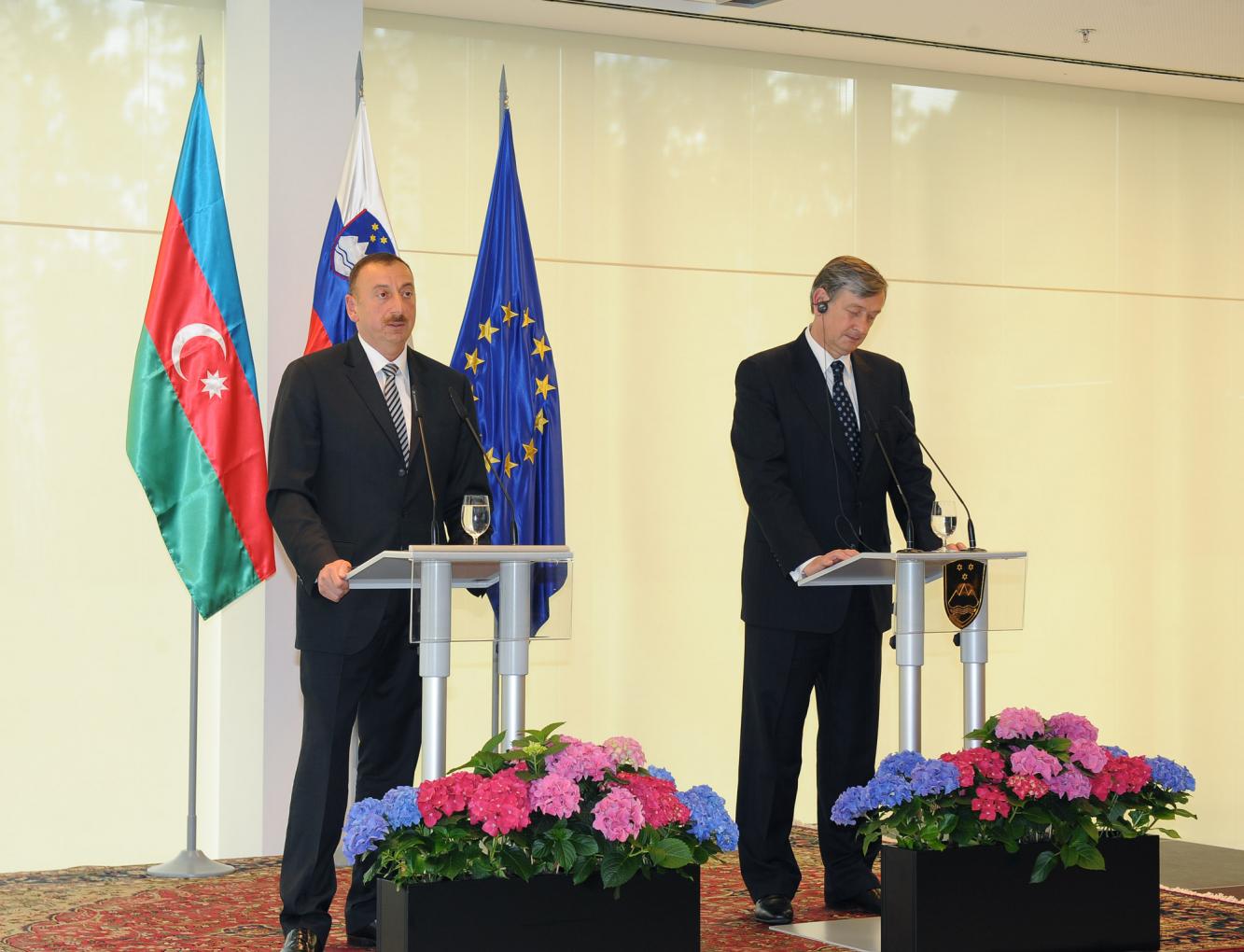
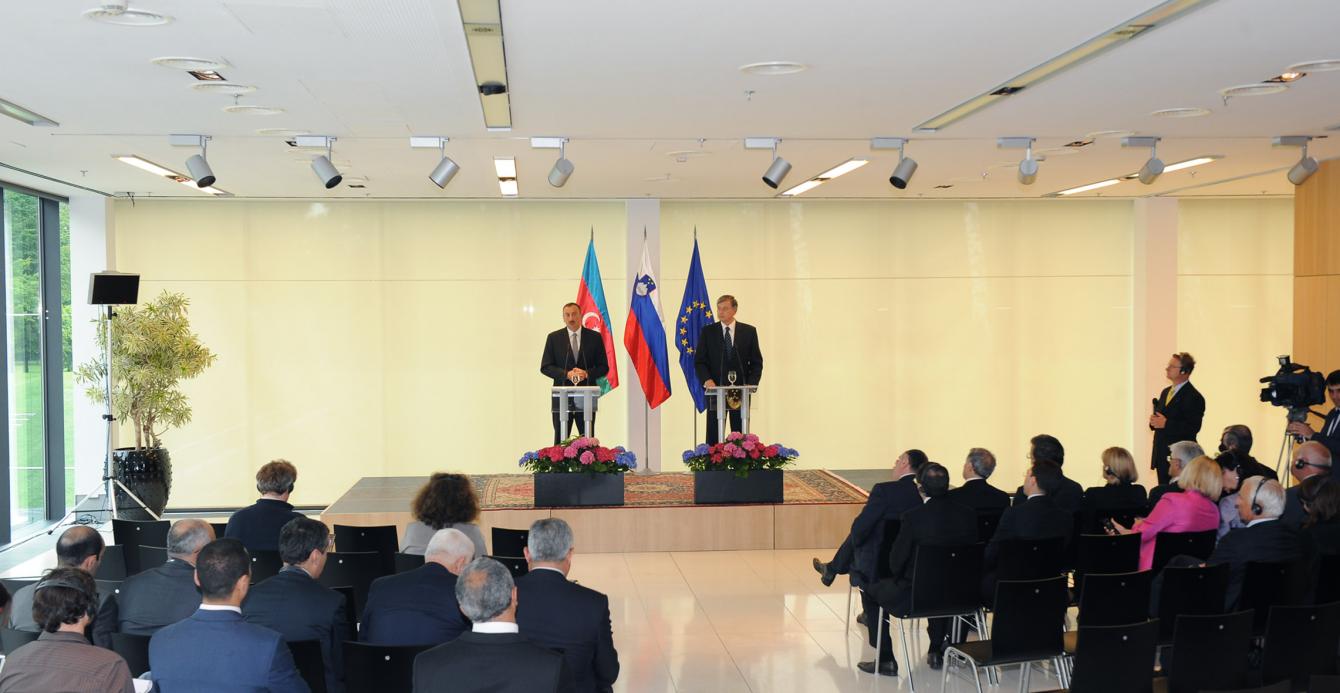
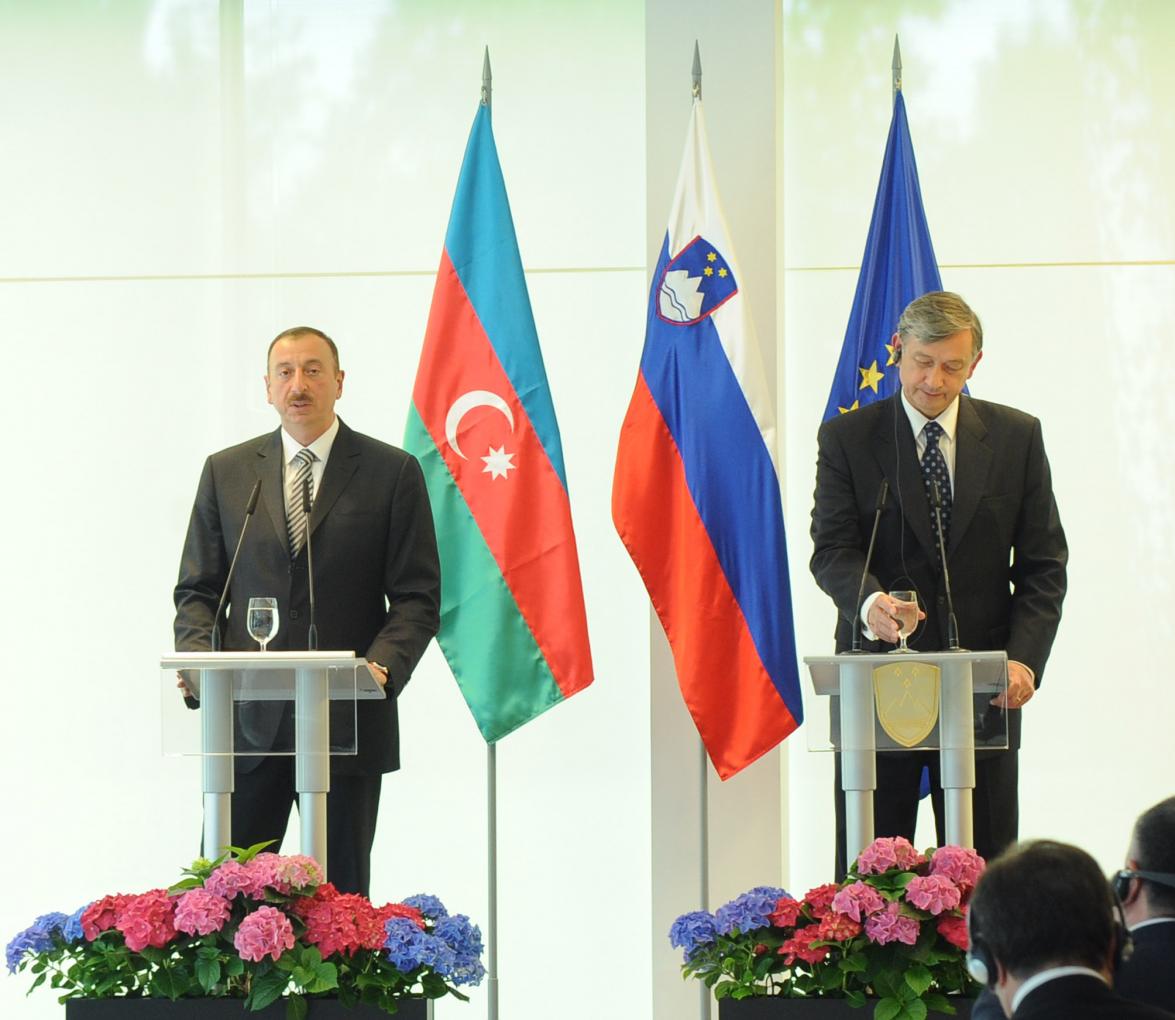

Aleksandar Vučić, President of the Republic of Serbia, made a phone call to the President of the Republic of Azerbaijan Ilham Aliyev, on April 16, briefing him on the pressures Serbia has been encountering recently and requesting the support of the friendly...
16 April 2024, 20:36Dear Mr. Pellegrini,
I sincerely congratulate you on your election as the President of the Slovak Republic.
The development of friendly relations with Slovakia holds great significance for us. Currently, there are good opportunities for enriching the...
15 April 2024, 13:06Prime Minister Muhammad Shehbaz Sharif of the Islamic Republic of Pakistan made a phone call to President Ilham Aliyev of the Republic of Azerbaijan on April 9.
Pakistan's Prime Minister congratulated the head of state on the occasion of Eid al-Fitr and wished...
09 April 2024, 19:52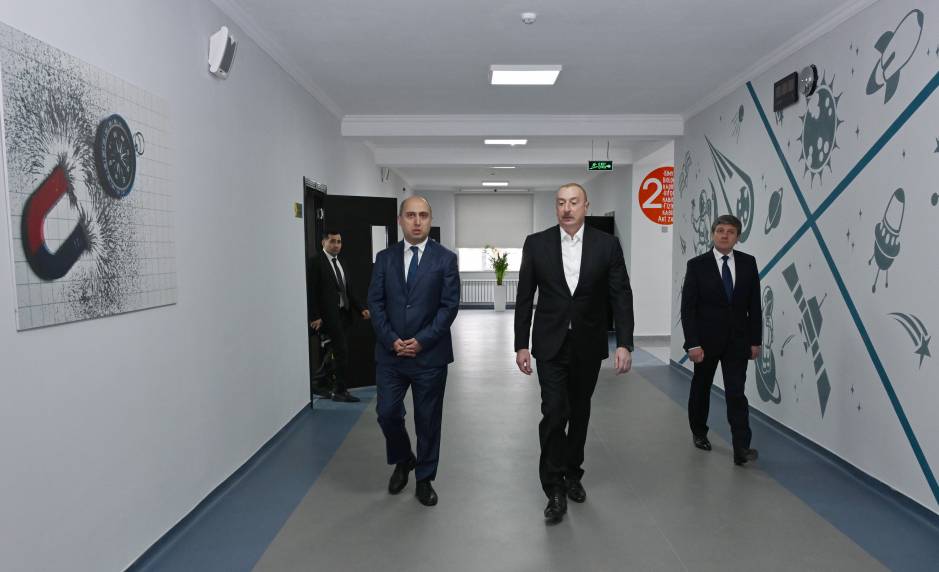
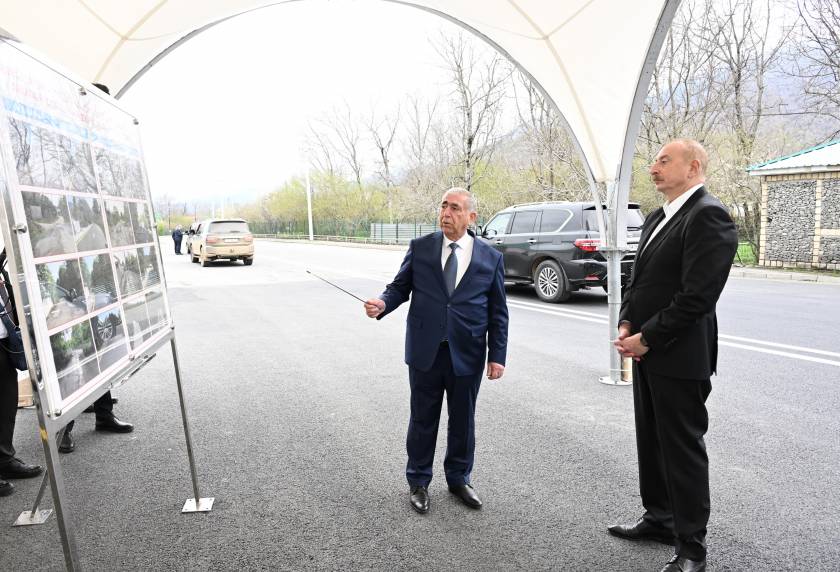
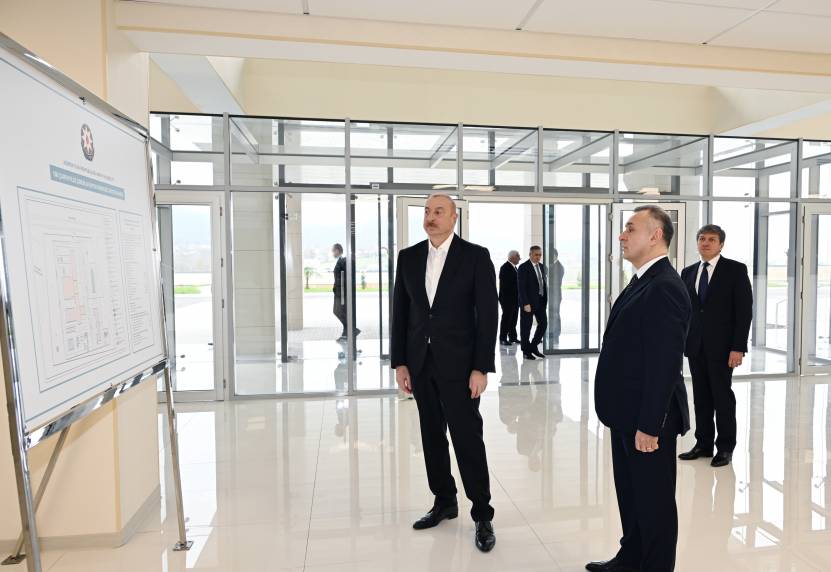
On April 9, President Recep Tayyip Erdogan of the Republic of Türkiye made a phone call to President Ilham Aliyev of the Republic of Azerbaijan.
The President of Türkiye congratulated President Ilham Aliyev on the occasion of Eid al-Fitr and wished the people of...
09 April 2024, 15:39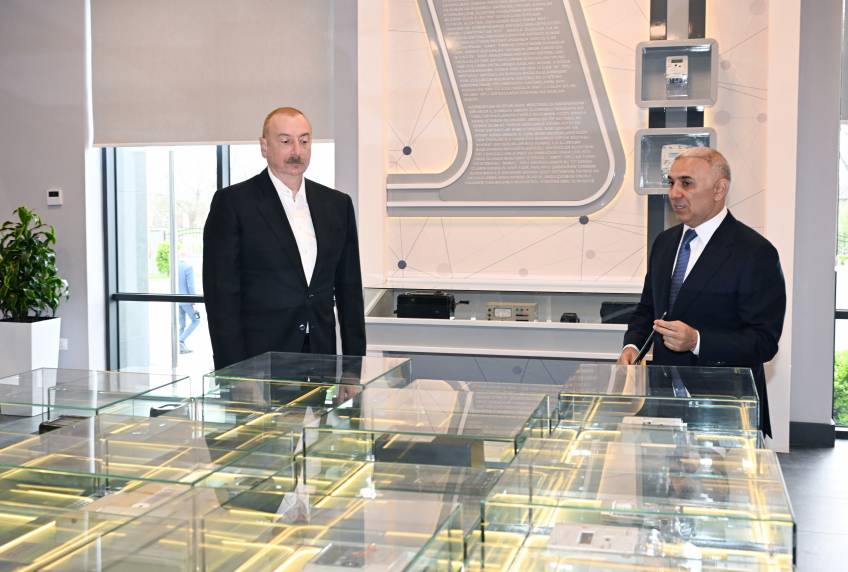
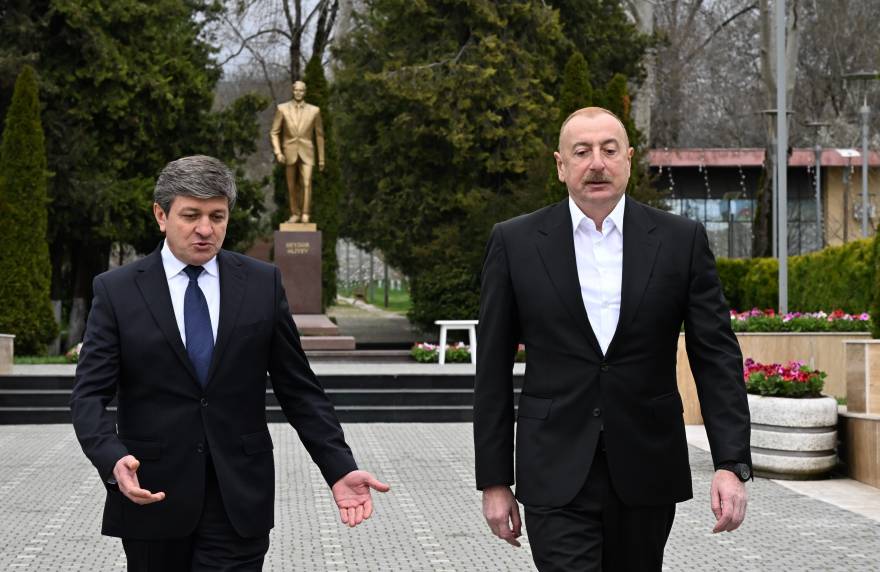
President of the Republic of Azerbaijan Ilham Aliyev has toured the Qabala district.
The head of state visited the monument to National Leader Heydar Aliyev erected in the city of Qabala and participated in the opening ceremonies of the 110/35/10 kV "Hajialili"...
09 April 2024, 15:14